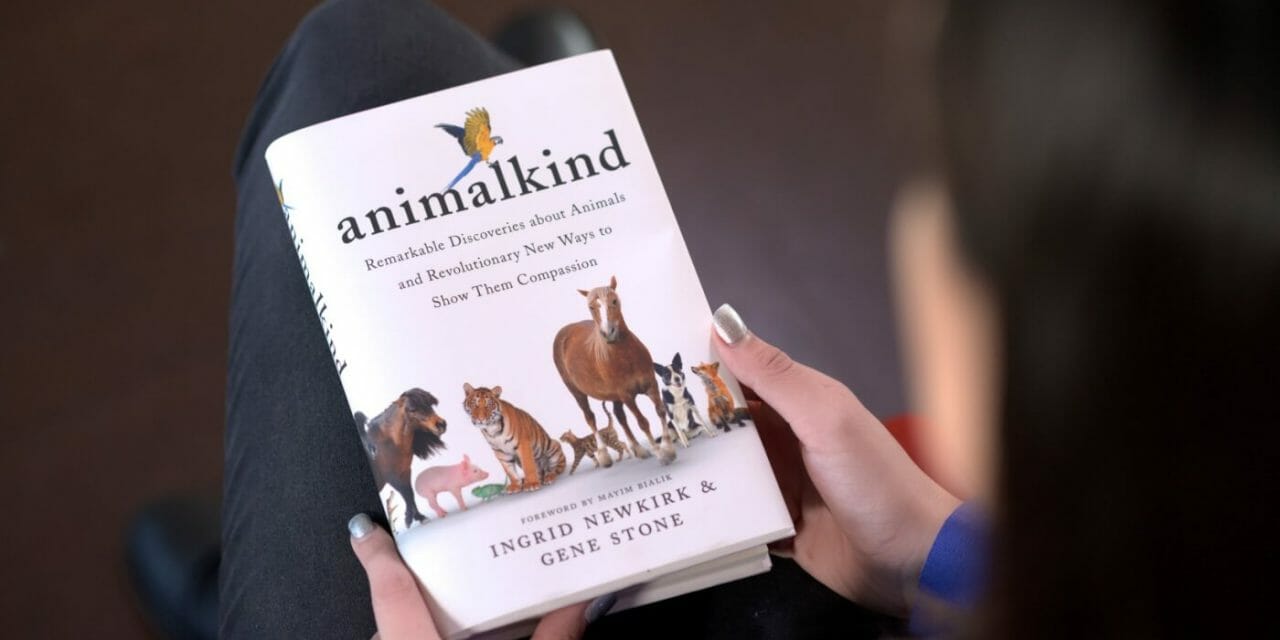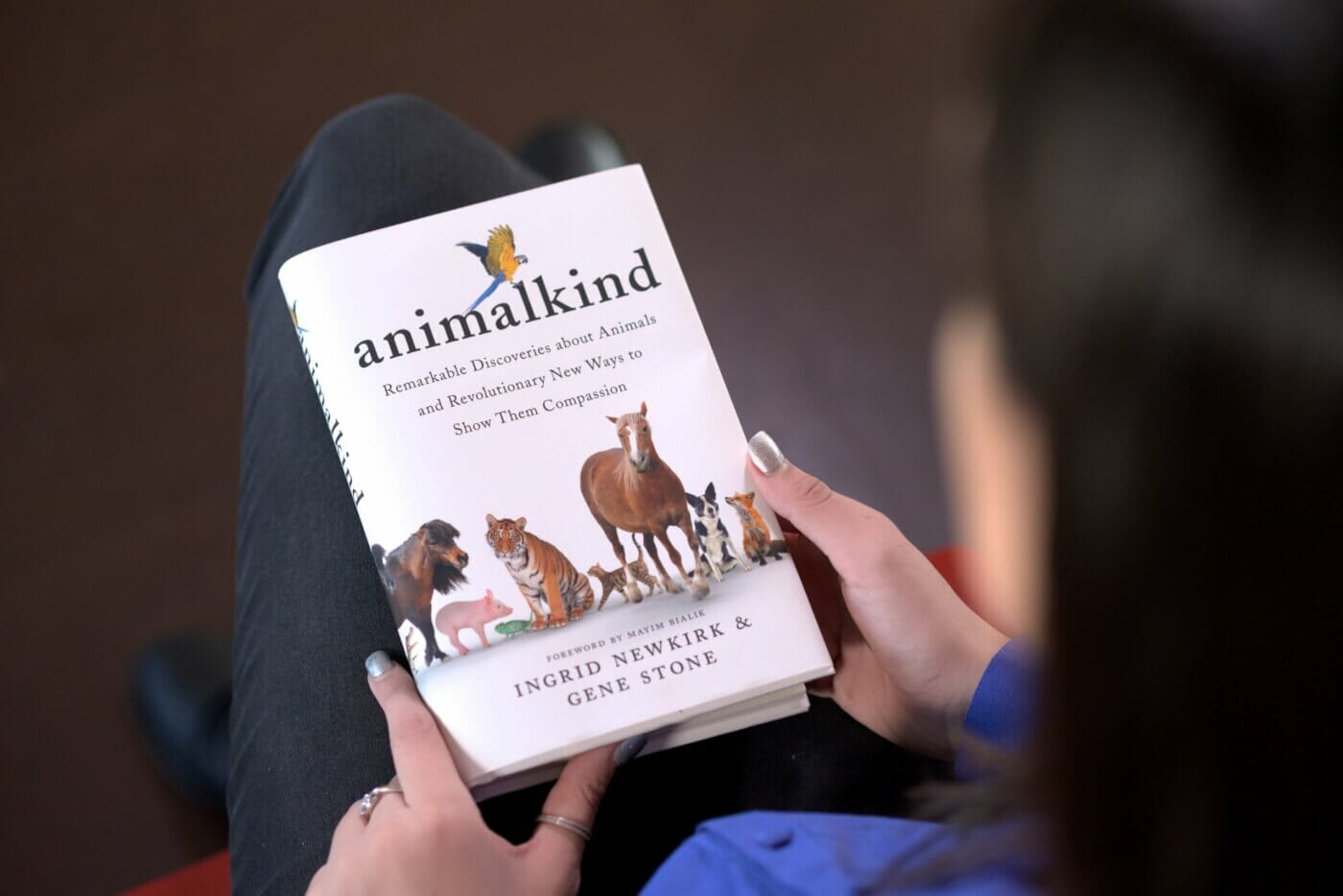Animalkind, a new exploration into the lives and minds of animals, has officially hit the shelves. PETA co-founder Ingrid Newkirk and Forks Over Knives author Gene Stone teamed up to share fascinating accounts of animals’ sophisticated communication, stunning intelligence, and heartwarming empathy, as well as ways in which we can avoid contributing to animal suffering.
The book is separated into two parts. First, Animalkind shocks and surprises readers with remarkable stories about animals who exemplify unique and complex behaviors. Birds are far more devoted to their life partners than we are; frogs use drainpipes to amplify their calls and combat excessive street noise; chickens can memorize and recall the faces and ranks of more than one hundred other birds. Many other captivating instances await the reader.
The second part focuses on medical science, clothing, entertainment, and food, and how these four industries contribute to animal exploitation and cruelty. Fortunately, exciting new technological advancements have the potential to replace the current harmful industry trends, and Newkirk and Stone outline how we can take a stand against animal abuse. Opt for cruelty-free grape leather over animal hide; promote your health and the environment with plant-based nutrition over artery-clogging animal-based products; embrace human cell technology and spare a monkey from life behind bars in laboratory cages; embrace virtual reality and animatronics over captive orca exhibits and elephants rides. With so many simple ways to help end animal suffering, we can all take action today.
I interviewed Ingrid about the book as well as her work to end all forms of animal oppression:
Nina: What inspired you to write this book, and what is your ultimate goal in creating Animalkind?
Ingrid: Almost daily (and sometimes more than once a day), my eye lights on an article, or a tidbit, about some extraordinary thing that humans have learned about other animals—a talent, an expression of a certain emotion, or an act of faithfulness, perhaps—and because I’ve been collecting them all, I was able to select the most interesting ones and share them via Animalkind.
N: What’s the most important message readers should take away from the book?
I: The most important message I hope people will take away from this book is how powerful they are through their purchases, habits, and everyday choices and how valuable they are to animal protection efforts. I also believe that they may come away questioning human supremacism—that misguided belief that somehow we are vastly superior to other animals in important ways when the only ways that really count are that we all share feelings of love, joy, and pain and the desire to live without being under someone else’s thumb.
N: What are some of the most surprising ways humans and other animals are alike?
I: Frankly, after all these years of learning about and coming to know animals, I no longer see them as being “like us” but as us. I see humans as one tribe among many—one animal in the great orchestra of life, as evidenced by the mother bird who risked her life to save her child, the chimpanzee who appreciates slapstick humor, and the squirrel who pretends to bury a nut in one place when she knows she’s being watched but, using sleight of hand, actually buries it elsewhere. In many ways, other animals far outdo us in their sense of direction, sense of smell, eyesight, endurance, bizarre and exotic forms of communication, knowledge of medicinal and poisonous plants, and ability to anticipate earthquakes, tidal waves, and changes in the weather. They are truly extraordinary. We don’t have to go into outer space to find intelligent life, because it’s already all around us.
N: What can readers do right this minute to help stop animal suffering?
I: There are a million things, starting with opening other people’s eyes, hearts, and minds by sharing online videos—happy and sad ones. Other easy-peasy ways include signing petitions; veganizing our wardrobes, cosmetics, and food choices; introducing others at work or school and in the family to delicious animal-free foods; giving cruelty-free gifts at every occasion; and investing in animal-friendly stocks, to name just a few.
N: Are you optimistic for the future — will society turn away from animal exploitation?
I: Because I’ve seen hundreds of wonderful victories for animals—from bans on animal circuses to the end of most fur sales—brought about because PETA members and supporters spoke up and passed on what they had learned, I’m extremely excited about the potential of personal activism. Each person who gets involved is like a bubble in a pot that’s coming to a boil!
N: Any other thoughts?
I: This book isn’t just for people who “get it,” who already understand that it’s vital that we help animals—it’s for all those fence-sitters, you know, those people with a dog or cat or hamster they love but who have never been inspired to go beyond looking after a domesticated animal. This is the wake-up book to give to them, as well as to libraries and schools, family members who haven’t yet grasped your passion, and even legislators. I want this book to serve as a catalyst for enormous good! All proceeds from its sale will go toward benefiting animal rights campaigns, such as getting orcas out of SeaWorld and promoting “adopt, don’t shop” efforts to close puppy mills.
Animalkind is on sale now in print, ebook and audiobook format; click here to get your copy now.








